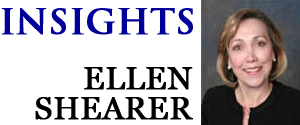
Posted May 28, 2014
WASHINGTON – The House Foreign Affairs Committee wants to make sure the United States isn’t beaten by the Russian propaganda machine, and wants to more fully enlist the Voice of America in that effort. But Congress might consider that a better way to combat Vladimir Putin’s efforts to push Russian values is to show the world that American values include a free an impartial press.
“The fact is that (the VOA) has been a great success in the Cold War era and beyond because it’s telling the truth,” said American Press Institute Executive Director Tom Rosenstiel. “We stand for a free press and that promotes democracy.”
The House bill, sponsored by Foreign Affairs Chairman Ed Royce, R-Calif., and New York Rep. Eliot Engel, the top Democrat on the committee, aims to make sure VOA knows its mission is “to support U.S. public diplomacy efforts.”
“There have always been places in the world where the VOA is the most reliable, most professional news source,” said my Medill School of Journalism colleague Associate Dean Craig LaMay, who is an expert on international media. “But there is now as there has always been a tension in its public service mission, and questions about its editorial independence.”
The Royce-Engle measure also is intended to fix a continuing management problem that, according to the State Department inspector general and others, clearly needs fixing. The VOA is governed by the Broadcasting Board of Governments, a part-time group whose members meet once a month. The bill would create a full-time agency head and turn the board into an advisory group.
A New York Times editorial said that “it is critical that the sponsors guarantee the American public as much as the world that standards of professional journalism will not be sacrificed in favor of a simplistic propaganda megaphone.”
“The proposed overhaul has understandably alarmed members of the V.O.A. news staff who fear that it will undermine a congressional mission enacted in 1976 that, far from a propaganda agency, set its role as an ‘accurate, objective, and comprehensive’ source of news,” the Times wrote.
One of those is Al Pessin, senior VOA foreign correspondent based in London and, in full disclosure, a member of the advisory board of the Medill National Security Journalism Initiative. In an op-ed published by The Hill newspaper, Pessin acknowledged that the Royce-Engel measure would keep intact the VOA charter language, requiring “accurate, objective, and comprehensive” news, But, he warned, it would be “only within the rubric of promoting U.S. foreign policy.”
“There are two main problems with this. First, it is not consistent with American values. VOA has always prided itself on showing the world what an objective American news organization is. These bills would require it to be more like Russia Today, a state organ that Secretary of State John Kerry recently called a ‘propaganda bullhorn,’” Pessin wrote. “. . . The second problem is that no one wants to listen to such a radio station, or watch such television broadcasts or visit such a website.”
There are other problems.
American foreign policy changes with administrations so the organization would become incoherent over time, Rosenstiel noted.
And, just as Pessin warned that no one would want to listen to an American propaganda radio service, Rosenstiel warned that no one would want to work for it.
“We as journalists don’t want to work there so they’d drive away the best talent,” he said.
But Lamay noted the VOA was created as a public diplomacy organ, originally under the U.S. Information Agency. “So how you see VOA’s mission depends on what kind of news and information you think constitute an effective public diplomacy program,” he said.
Ellen Shearer is co-director of the National Security Journalism Initiative, as well as the William F. Thomas Professor of the Medill School of Journalism, Media, Integrated Marketing Communications at Northwestern University. She teaches in the school’s Washington Program. Before joining the Medill faculty, she was a senior editor at New York Newsday, a consulting editor at Newhouse News Service, marketing executive at Reuters, and held positions as senior executive, bureau chief and reporter at United Press International.





